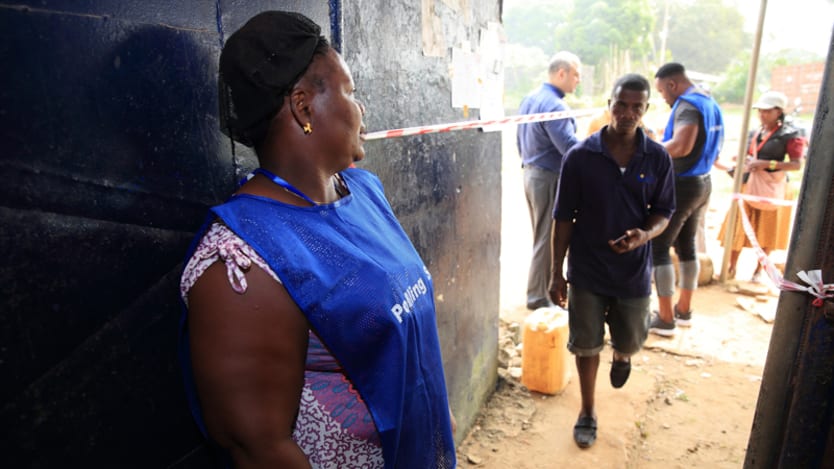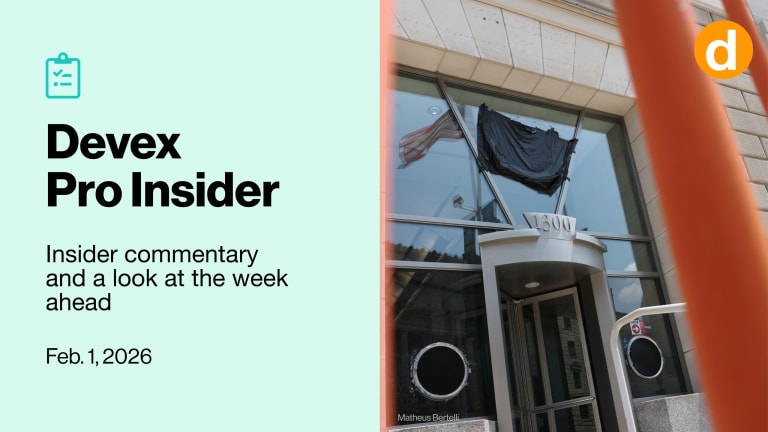
ABIDJAN — Just two weeks after Liberia’s runoff election where the country realized its first democratic transfer of power, and 12 years after boasting the election of Africa’s first female president, experts say the country must now expand beyond its traditional sources of revenue to provide better livelihoods for youth under the new leadership of former soccer star and president-elect, George Weah.
Many development experts argue that in order for Africa’s first republic to advance towards industrialization, and recover from the legacy of its decade-long civil war, policy shifts and job creation are essential. Yet Weah’s relative lack of lengthy political experience means many observers are uncertain of the country’s future trajectory under his leadership.
“Most anyone who has a passing understanding of what the Liberian needs are, comprehends that they relate to the aftermath of the civil war and the huge youth bulge that has developed,” former Minister of State for Presidential Affairs and university professor Elwood Dunn, told Devex.
“The lack of opportunities for the bottom two-thirds of the population needs to be addressed, and the government needs to adjust policies with a slightly different approach to addressing some of these problems,” Dunn added.
Opinion: Liberia’s battle to educate our next generation
Liberia's education minister answers critics of the country's education reform initiatives.
Dunn suggests that the country’s education system should be revised to meet the current demands of the economy, and that Weah should focus on constructing additional vocational training learning centers. “That’s where the jobs are,” he argued. “We need a trained core of Liberian electricians, masons, engineers and carpenters.”
Voting for change
Winning the Dec. 26 runoff election against Vice President Joseph Boakai secured the presidency for Weah, a 1995 FIFA World Player of the Year and Ballon d’Or winner. Experts say many voted for him as a vote for change. Boakai was seen as potentially continuing the presidency of the Sirleaf administration, where he served as vice president since 2006.
However, Weah has been lauded for a long-term commitment to politics, following failed presidential and vice presidential candidacies in 2005 and 2011, respectively. He went on to a secure a Senate seat in 2014 after defeating Robert Sirleaf, son of the then-president. Though his brief Senate career has rarely received accolades, his political party has credited him with launching a post-Ebola, back-to-school empowerment program, and has supported his push for and more budgetary support for coastal erosion and environmental projects. He is also said to have engaged Senate leaders on how the legislature could improve its decision-making role in the national budgetary process.
“The fact of the matter is there is a sense of anti-intellectualism in Liberia at the moment where people are saying ‘all those book people, meaning elites, didn’t do enough for the country after 12 years, so why should we give them another mandate; let’s give it to someone who has a heart for the country,’ and I think Weah represents that to a lot of people,” Liberian political analyst Robtel Neajai Pailey told Devex.
“People are really fed up with the status quo, with rising inequality, particularly young people are fed up with the high unemployment rates and lack of inclusive growth,” she continued. “That trickle down effect didn’t positively impact most people, and I think people are also enamored with his amazing rags to riches story.”
Liberia is predicted to experience 3 percent GDP growth this year, according to the World Bank, and is classified as a least-developed, low-income, food deficit country by the World Food Programme. The latest Human Development Index also ranks Liberia 177 out of 188 countries. This West African nation is strangled by poverty, with more than 50 percent of the population below poverty level. The health care systems and education systems struggle to effectively provide results for its residents, and critical infrastructure — such as roads and electricity — are slowly being rebuilt.
In 2005, when Ellen Johnson Sirleaf was elected president, many Liberians had high hopes for the Nobel Peace Prize winner. However, accusations of corruption, unmet promises, and a widening income inequality gap has meant her legacy is mixed amongst Liberians at home and abroad — though she maintains a strong reputation within much of the development community.
“When Sirleaf first took office, Liberia was pretty good about bringing in direct foreign investments: Everything from iron ore, palm oil, and crude oil companies were flocking here. We recorded almost double digit growth rates, but that growth didn’t trickle down, so the vast majority of the population maintained their position at the very bottom of the rung,” Pailey explained.
Traditionally reliant on iron ore, rubber, timber, gold, and diamond exports, when commodity prices tanked, the resource-dependent country felt the brunt of the impact locally. Dunn said going forward, the new administration should prioritize agriculture and industrialization.
Pailey argued that an unequal distribution of wealth — especially among state workers — hampered the country’s ability to advance towards becoming a middle-income economy. Health care workers, teachers, lower level civil servants earn small government wages while legislative members and presidential appointee salaries absorb a majority of the employee compensation budget, she said.
Meanwhile, only a fraction — $55 million — of the government’s $563.5 million budget is projected to support the national “public sector investment plan.” The 2017-18 fiscal budget states that allocation of these funds will primarily support ongoing road rehabilitation, elections, and the “executive mansion renovation.” The document also states that increases in recurrent expenditures leave “very little space for public investment.”
“We constantly rely on donor aid for basic social services like health care and education but, for me, the disconnect is that we say that we want to push for development transformation in the country but the resources that we do have in terms of collection of revenue from big multinational corporation concessions are not divvied out equally,” Pailey told Devex.
A presidential push for Liberian transformation
After his election win and global news coverage of his campaign, some analysts, like many Liberians, have placed a high level of expectation on Weah.
During his victory speech, Weah promised to improve the lives of all Liberians through a pro-poor public governance. He invited diaspora Liberians to “come home,” saying the country needs their skills, expertise, ideas, and talents. He also said he will assemble a government dedicated to the “ideas of the grassroots” and social transformation. “Persons looking to cheat the Liberian people through the menace of corruption will have no place in my administration,” he warned.
“I declare publicly that transforming the lives of all Liberians is a singular mission and focus of my presidency,” he said.
Over the long term, he said his strategy to delivering transformation will be via private sector investments. “We will work to relax the constraints to private investment; strengthen the business, legal, and regulatory environment and protect business profits,” he announced.
Dunn said the country now moves into an experimental period, with no guarantee of his success or failure. “We just hope that [Weah] will surround himself with the right people and that they will begin on the right footing, with the right policies and right attitude to address some of the issues mentioned,” he said.
Read more Devex coverage on Liberia.






